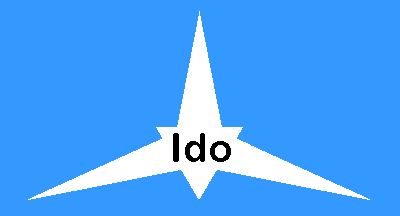
image by António Martins, 05 June 1999

FOTW beschäftigt sich mit der Wissenschaft der Vexillologie (Flaggenkunde).
Alle auf dieser Website dargebotenen Abbildungen dienen ausschließlich der Informationsvermittlung im Sinne der Flaggenkunde.
Wir distanziert uns ausdrücklich von allen hierauf dargestellten Symbolen verfassungsfeindlicher Organisationen.
Last modified: 2017-10-07 by antónio martins
Keywords: ido | star: 6 points (white) |
Links: FOTW homepage |
search |
disclaimer and copyright |
write us |
mirrors

image by António Martins, 05 June 1999
See also:
With approx. 5000 speakers, Ido is nowadays one of maybe six or seven
“living artificial languages”. It
can be said that Ido is a French-flavoured version of Esperanto (although
there are a lot of other differences). The Ido movement has not, to best
of knowledge, grown noticeably since its creation in 1907 as a
“schism” within Esperanto.
António Martins, 04 Jun 1999
According to Rodríguez
[rod97], the motto
was later changed to "LINGUO INTERNACIONA
UNIVERSALA" («International Universal Language»),
and three of the star’s points were reduced, the longer
alternating with the shorter, one longer pointing upwards.
It’s sometimes said that the six pointed star stands for
an “upgrade” of Esperanto’s five
pointed star, but I have no solid support for this on — only,
as said, the origin of the language and it’s own name present
it as an “offspring” of Esperanto…
António Martins, 04 Jun 1999
In Panorama in interlingua 2/1991: p.16 “Ab le
archivo” [ial91a] black and white
symbols of constructed languages from «our archive» (probably
the image sources as for [rod97]?), which
I quote: (dates are probably language publishing, not symbol creation,
judging from the Esperanto example): «Ido, 1907, stella azur»
and «nover version ab 1980»: both versions as
in [rod97], said to be
pre- and post-1980.
António Martins, 13 Aug 2007

image by António Martins, 04 Jun 1999
The six pointed star was used for the first time in 1907 in a seal
like device. According to Rodríguez
[rod97], this star had the word
"Ido" in blue letters, was equalpointed and laid on a blue circle,
around which a white ring read "LINGUO INTERNACIONA DI LA
DELEGITARO" (meaning «International language of the
delegation», refering to a 1907 interlinguistics conference where the
language was first presented mentioned — see above).
I don’t know if the earlier version was used on flags. My source
shows the typeface to be the one I used, Arial Rounded (or very similar).
I made the letters black to conform the refered image found on the
web.
António Martins, 04 Jun 1999
Article [ial91a] says this to be the
pre-1980 version of the emblem.
António Martins, 13 Aug 2007
Anything below this line was not added by the editor of this page.
Hosted by: Fanshop-Online.de und Handy-Shop.de
Tipp: Apple iPhone XR